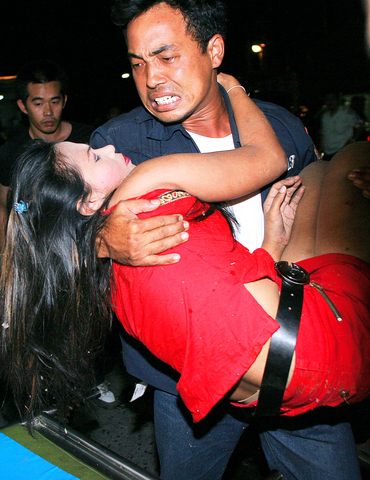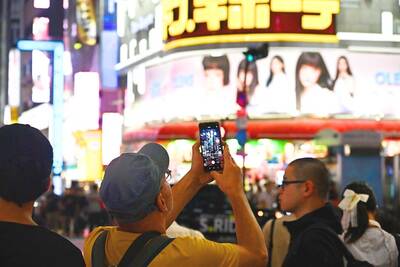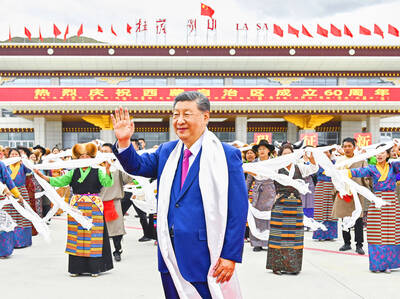Striking while thousands were celebrating Lunar New Year, suspected Muslim insurgents killed six people and wounded at least 50 in overnight bombings and attacks across four provinces in southern Thailand, officials said yesterday.
An army spokesman said Islamic insurgents were trying to scare ethnic Chinese out of the predominantly Muslim region.
The violence continued yesterday as bombs exploded at three locations, killing one army major, injuring three policemen and wounding seven others.

PHOTO: AFP
The attacks were the second wave of New Year's bombings Thailand has faced in recent months. Bangkok was struck by a series of eight explosions on Dec. 31, although authorities said southern insurgents were not responsible. Three people were killed and almost 40 wounded.
Sunday's attacks were the first time the insurgents have struck all four of the enflamed southern provinces -- Yala, Narathiwat, Pattani and Songkhla -- at the same time, army spokesman Colonel Akara Thiprote said.
"The insurgents wanted to scare away Chinese businessmen from the region. That's why they attacked on Sunday, the day that Chinese people celebrate after they pay homage to their ancestors. The insurgents do not want people of other religions to live with them," Akara said.
Triggered by digital watches, 29 bombs rocked the predominantly Muslim deep south, most of them set to explode between 7:15pm and 8pm, Akara said. The targets were karaoke lounges, hotels, schools, gasoline stations and power grids.
Three people of Chinese descent were gunned down in Pattani, another person was shot and killed in Narathiwat, while bombs at a karaoke parlor in the tourist town of Betong on the Malaysian border killed two others, Akara said.
Four of the 50 injured were in critical condition, he said. Akara said the bombs weighed 3 to 5kg.
The violence near the Malaysian border continued yesterday morning when a homemade bomb killed a Thai army major near his home in Yala Province and wounded a seven-year-old boy, provincial police chief Major-General Phaitoon Chuchaiya said.
In Narathiwat Province, police said three officers were injured by a bomb explosion yesterday as their eight-man patrol neared a small railway station in Rue So district. The bomb, planted on the station roof, was reportedly triggered by a mobile telephone signal.
In the capital of Pattani, police reported seven people were injured when a bomb went off in a car sales showroom.
Violence in the south has been escalating in recent months despite a major policy shift by the military-imposed government, which is trying to replace an earlier iron-fisted approach in dealing with the rebels with a "hearts and minds" campaign.
More than 2,000 people have died in the four provinces since the insurgency erupted in 2004, fueled by accusations of decades of misrule by the central government. The insurgents have not announced their goals, but are believed to be fighting for a separate state imbued with radical Islamic ideology.
Military reports said that 17 bombs went amid Sunday's attacks in Yala, the worst-hit province, including seven in the border town of Betong, which attracts Malaysians, Singaporeans and other foreign tourists to its many entertainment venues. The tourist town of Sungai Kolok, along the Thai-Malaysian border in Narathiwat Province, was also attacked.
A sizable number of Sunday's bombings were against karaoke parlors, which are regarded as decadent by the Islamic rebels. At least two schools were burned down.
Two explosions tore through power stations in Pattani Province, causing blackouts in several areas, Pattani police Major-General Kokiat Wongworachart said.
Akara that besides disrupting the New Year festivities the rebels wanted to show the international community that the Bangkok government could not control the situation in southern Thailand, thus underlining the rebels' legitimacy as separatists.

Ten cheetah cubs held in captivity since birth and destined for international wildlife trade markets have been rescued in Somaliland, a breakaway region of Somalia. They were all in stable condition despite all of them having been undernourished and limping due to being tied in captivity for months, said Laurie Marker, founder of the Cheetah Conservation Fund, which is caring for the cubs. One eight-month-old cub was unable to walk after been tied up for six months, while a five-month-old was “very malnourished [a bag of bones], with sores all over her body and full of botfly maggots which are under the

BRUSHED OFF: An ambassador to Australia previously said that Beijing does not see a reason to apologize for its naval exercises and military maneuvers in international areas China set off alarm bells in New Zealand when it dispatched powerful warships on unprecedented missions in the South Pacific without explanation, military documents showed. Beijing has spent years expanding its reach in the southern Pacific Ocean, courting island nations with new hospitals, freshly paved roads and generous offers of climate aid. However, these diplomatic efforts have increasingly been accompanied by more overt displays of military power. Three Chinese warships sailed the Tasman Sea between Australia and New Zealand in February, the first time such a task group had been sighted in those waters. “We have never seen vessels with this capability

A Japanese city would urge all smartphone users to limit screen time to two hours a day outside work or school under a proposed ordinance that includes no penalties. The limit — which would be recommended for all residents in Toyoake City — would not be binding and there would be no penalties incurred for higher usage, the draft ordinance showed. The proposal aims “to prevent excessive use of devices causing physical and mental health issues... including sleep problems,” Mayor Masafumi Koki said yesterday. The draft urges elementary-school students to avoid smartphones after 9pm, and junior-high students and older are advised not

Chinese President Xi Jinping (習近平) attended a grand ceremony in Lhasa yesterday during a rare visit to Tibet, where he urged “ethnic unity and religious harmony” in a region where China is accused of human rights abuses. The vast high-altitude area on the country’s western edge, established as an autonomous region in 1965 — six years after the 14th Dalai Lama fled into exile — was once a hotbed for protest against Chinese Communist Party rule. Rights groups accuse Beijing’s leaders of suppressing Tibetan culture and imposing massive surveillance, although authorities claim their policies have fostered stability and rapid economic development in